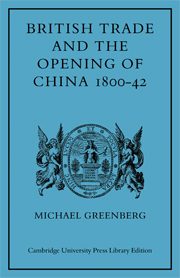Book contents
- Frontmatter
- Contents
- Money, Weights and Abbreviations
- Author's Preface
- CHAPTER I THE OLD CHINA TRADE
- CHAPTER II THE HONOURABLE COMPANY AND THE PRIVATE ENGLISH
- CHAPTER III THE CANTON COMMERCIAL SYSTEM
- CHAPTER IV THE DEVELOPMENT OF THE CANTON TRADE TO 1834
- CHAPTER V OPIUM
- CHAPTER VI BUSINESS AND FINANCIAL ORGANISATION
- CHAPTER VII THE VICTORY OF THE FREE TRADERS
- CHAPTER VIII LEDGER AND SWORD
- APPENDICES
- Bibliography
- Index
CHAPTER VII - THE VICTORY OF THE FREE TRADERS
Published online by Cambridge University Press: 07 October 2011
- Frontmatter
- Contents
- Money, Weights and Abbreviations
- Author's Preface
- CHAPTER I THE OLD CHINA TRADE
- CHAPTER II THE HONOURABLE COMPANY AND THE PRIVATE ENGLISH
- CHAPTER III THE CANTON COMMERCIAL SYSTEM
- CHAPTER IV THE DEVELOPMENT OF THE CANTON TRADE TO 1834
- CHAPTER V OPIUM
- CHAPTER VI BUSINESS AND FINANCIAL ORGANISATION
- CHAPTER VII THE VICTORY OF THE FREE TRADERS
- CHAPTER VIII LEDGER AND SWORD
- APPENDICES
- Bibliography
- Index
Summary
The End of the Company's Charter
‘The extinction of the Company's monopoly and the simultaneous opening of the China trade to the enterprise and industry of British manufacture and shipping, marks a new and memorable era in the commercial annals of our Nation’. With these words of explanation, Phipps offered his Treatise on the China Trade to an eager public. A private letter of December 1833 from a British merchant established in China for the previous fifteen years agreed that ‘the opening of the home trade in April, 1834, will form a grand epoch in the Annals of Canton’; but it proceeded to express uncertainty as to the outcome of the change. If it is realised that more than half of British trade with China was already in private hands before 1834, it will help to put that ‘memorable’ year in its true perspective. (Thus, in the season 1825-6, $15.7 million out of £21.2 million of British imports into China, and $12.6 million out of $21.1 of exports, were on private account.) The change was not, therefore, primarily a matter of taking over the Company's trade.
It will be recalled that by the 1820s the ‘private English’ had succeeded in obtaining an established footing at Canton within the framework of the Company's monopoly, and that these two groups of British merchants in China were able to exist together for a time because their respective trades moved in ‘different spheres’. But the rapid growth of the Country Trade upset the balance and produced a divergence of interest.
- Type
- Chapter
- Information
- British Trade and the Opening of China 1800–42 , pp. 175 - 195Publisher: Cambridge University PressPrint publication year: 1970



